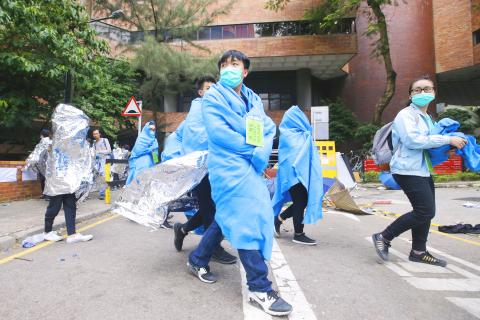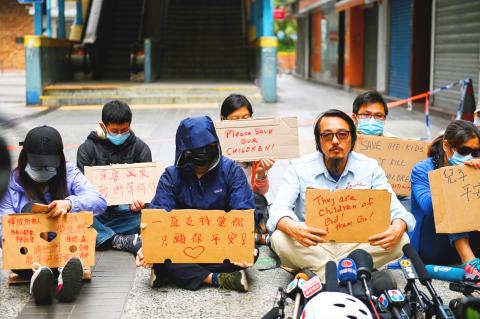About 100 protesters yesterday remained holed up at Hong Kong Polytechnic University surrounded by police on the third day of the most prolonged and tense confrontation in more than five months of conflict in the territory.
About 600 protesters surrendered to authorities at the campus in Kowloon overnight, after police allowed two representatives to mediate between the two sides, Hong Kong Chief Executive Carrie Lam (林鄭月娥) said.
Activists were yesterday morning evacuated to seek medical help.

Photo: AP
Riot police surrounded the red-brick campus that protesters took over and turned into a fortress, firing tear gas at groups who tried to escape.
Police urged the activists to surrender peacefully.
Tens of thousands of people have taken to the streets over the past three days in attempt to reach the protesters at the university, prompting intense clashes with riot police firing tear gas, rubber bullets and, in a few incidents, live rounds.

Photo: AFP
Police said that they have arrested about 1,100 people since Monday.
The Hong Kong Hospital Authority said that it has received almost 300 injured people from the university and asked the public not to go to accident and emergency departments unless absolutely necessary.
In her first public remarks since the crisis began with clashes between police and protesters on Sunday, Lam said that 200 of those who surrendered were children and were not arrested.
However, she said that authorities reserved the right to make further investigations.
The other 400 who left the campus have been arrested, she added.
Groups of protesters have tried to escape the tight police cordon around the campus.
Late on Monday, dozens were seen rappelling down a footbridge — as police fired tear gas — and were driven away on motorbikes.
Others tried to flee by crawling through maintenance holes into sewers, before firefighters arrived on the scene to warn them it was unsafe.
As Hong Kong’s political crisis reaches new heights, Beijing has issued increasingly severe warnings, prompting fears of intervention.
Following a Hong Kong High Court ruling on Tuesday that a ban on masks was unconstitutional, the Chinese National People’s Congress said that only it has the power to rule on the constitutionality of legislation under the territory’s Basic Law.
Chinese Ambassador to Britain Liu Xiaoming (劉曉明) on Monday said that the Hong Kong government was “trying very hard to put the situation under control.”
“But if the situation becomes uncontrollable, the [Chinese] central government would certainly not sit on our hands and watch,” he said. “We have enough resolution and power to end the unrest.”
An English-language editorial in the Chinese state-run Global Times yesterday said: “The rule of law can save Hong Kong, but the premise is that the rioters must be punished. The mob’s terror-like violence is bound to be punished.”
Several trains connecting China with Hong Kong have been suspended for yesterday and today.
Meanwhile, Hong Kong Commissioner of Police Chris Tang (鄧炳強) yesterday took office with a warning that “fake news” was undermining the reputation of his 30,000-strong force and called for the territory’s residents to help end the turmoil.
Tang replaced Stephen Lo (盧偉聰), who had presided over months of unrest.
Jasper Tsang (曾鈺成), a pro-Beijing politician and former head of the Hong Kong Legislative Council who helped mediate the surrender of students on Monday, told reporters that there could be bloodshed if the police entered the university campus by force, where they were likely to meet strong resistance.
“This is something that we want to avoid,” he said.

Conflict with Taiwan could leave China with “massive economic disruption, catastrophic military losses, significant social unrest, and devastating sanctions,” a US think tank said in a report released on Monday. The German Marshall Fund released a report titled If China Attacks Taiwan: The Consequences for China of “Minor Conflict” and “Major War” Scenarios. The report details the “massive” economic, military, social and international costs to China in the event of a minor conflict or major war with Taiwan, estimating that the Chinese People’s Liberation Army (PLA) could sustain losses of more than half of its active-duty ground forces, including 100,000 troops. Understanding Chinese

The Ministry of Foreign Affairs (MOFA) yesterday said it is closely monitoring developments in Venezuela, and would continue to cooperate with democratic allies and work together for regional and global security, stability, and prosperity. The remarks came after the US on Saturday launched a series of airstrikes in Venezuela and kidnapped Venezuelan President Nicolas Maduro, who was later flown to New York along with his wife. The pair face US charges related to drug trafficking and alleged cooperation with gangs designated as terrorist organizations. Maduro has denied the allegations. The ministry said that it is closely monitoring the political and economic situation

UNRELENTING: China attempted cyberattacks on Taiwan’s critical infrastructure 2.63 million times per day last year, up from 1.23 million in 2023, the NSB said China’s cyberarmy has long engaged in cyberattacks against Taiwan’s critical infrastructure, employing diverse and evolving tactics, the National Security Bureau (NSB) said yesterday, adding that cyberattacks on critical energy infrastructure last year increased 10-fold compared with the previous year. The NSB yesterday released a report titled Analysis on China’s Cyber Threats to Taiwan’s Critical Infrastructure in 2025, outlining the number of cyberattacks, major tactics and hacker groups. Taiwan’s national intelligence community identified a large number of cybersecurity incidents last year, the bureau said in a statement. China’s cyberarmy last year launched an average of 2.63 million intrusion attempts per day targeting Taiwan’s critical

‘SLICING METHOD’: In the event of a blockade, the China Coast Guard would intercept Taiwanese ships while its navy would seek to deter foreign intervention China’s military drills around Taiwan this week signaled potential strategies to cut the nation off from energy supplies and foreign military assistance, a US think tank report said. The Chinese People’s Liberation Army (PLA) conducted what it called “Justice Mission 2025” exercises from Monday to Tuesday in five maritime zones and airspace around Taiwan, calling them a warning to “Taiwanese independence” forces. In a report released on Wednesday, the Institute for the Study of War said the exercises effectively simulated blocking shipping routes to major port cities, including Kaohsiung, Keelung and Hualien. Taiwan would be highly vulnerable under such a blockade, because it